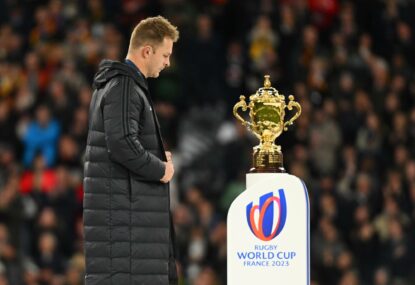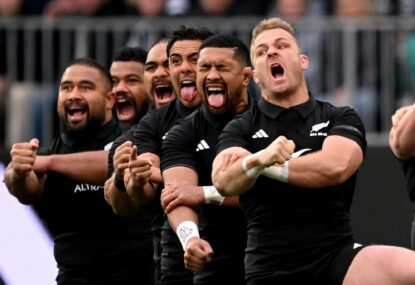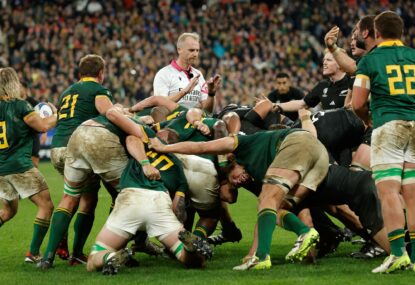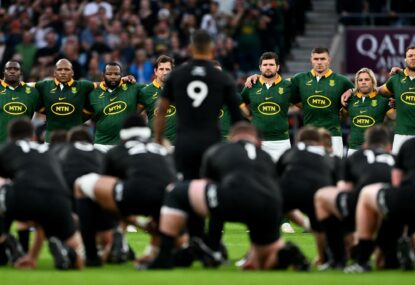If Robbie Deans and John O’Neill had said at the beginning of the season that they would record nine Test wins at season close, both men would have been content.
The fourteen test match season was the most games played outside of a World Cup year, and only losses to champion teams (World, Tri and Six Nations champions) indicates a better than average season.
It also must be taken into perspective that new coach Robbie Deans – as feted as he is by the Australian media – only took control of the national team just days after his focus was on Canterbury in the Super 14.
Australia seems able to compete with both New Zealand and South Africa, but admittedly won when opposition played poorly.
But the Wallabies have shown a tendency to compete inefficiently for an entire match, either switching off and losing (as they did against the All Blacks in Brisbane) or only switching on when the game is already lost (ergo the game versus the Welsh).
Equally, when the All Blacks and Springboks have fired complete broadsides at the Wallabies, they have had no answer, with heavy 29 and 45 point losses respectively.
Against weaker opposition, the Wallabies have shown a tendency to struggle to dominate structure against their foes. Italy and France outplayed them in the set piece, and only a poor final ten by Italy and a shocking display by French fly half David Skrela allowed Australia to win.
How could the team that competed in the Tri Nations struggle against second tier opposition?
It is easy to say that the Wallabies are re-structuring and re-building, but no more so than any other team in world rugby.
First, the appropriate credit must be given.
Back to back wins over the World Champions, inflicting one of the All Blacks heaviest losses in years, losing just one game at home by four points to the world’s best team, and conquering their historical bete noire, the inability to win away.
But while Deans is a results man, and would reflect on such as 2008 being a successful season, these achievements cannot mask some lurking problems in this Wallaby team.
It could be said that the Wallabies have made progress on their great Achilles heel, the scrum, but while optimists could state that they subjugated a nightmare by beating England and dominating their scrum, the same eight were embarrassed by France and Italy, and at times suffered problems against both the All Black and Springbok packs.
While Stephen Moore has developed into one of the world’s premier hookers, it is the lack of a class prop that is hurting Australia. Al Baxter and Matt Dunning are adequate stop gap players, but neither will ever dominate, and should give way to players such as Benn Alexander and Ben Robinson – both of whom need more development.
Ideally Deans will scrutinise Australia’s propping talent in the Super 14, and must select the form fatties. He needs players who will scrummage, not players who will plot to mask their deficiencies like Baxter and Dunning.
The locks and loose forwards, suffer from inconsistency. In George Smith they have the world class player to build around, and with players such as Hugh McMeniman, James Horwill and Richard Brown, they have burgeoning talent that will improve over time.
To rule the breakdown is to win the game, but a breakdown is not just governed by a man like Smith. A large part of Richie McCaw’s effectiveness is that he has 14 players who contest the breakdown with him.
The Wallabies must remember that every tackle initiates the contest for the ball at all times – not just for periods of the game.
The real hangover of Gregan has surfaced this year. He played in national colours for too long, and as a consequence, Australia is bereft of a class halfback. Luke Burgess has had the game time, but is lacking in high level skill. If he does not perform in the Super 14, a new man – such as Brett Sheehan – should be selected.
Wallaby halfbacks must stop taking steps before linking the ball to their back lines.
The outside backs are far from settled, with the value of Berrick Barnes shown in his absence. The 10/12 axis must be explored thoroughly by the coaching team.
Giteau belongs in the team no doubt, but is his ball playing brilliance better suited in the middle of the field?
He is individually one of the best players in the world – but it must be asked, can he control a game in the manner of a dictating fly half?
Stirling Mortlock, as good as he is defensively and as a ball carrier, does not have the playmaking skills to do the Wallabies justice. Furthermore, Deans has spent years playing his teams with two genuine playmakers in the 10/12 bloc.
His coaching is suffering have two crash runners in the centre positions.
As paradoxical as it may sound, for every strong point the Wallabies have, the same area has a glaring weakness.
Perhaps Deans would do well to watch the natural structures of Australia’s Super 14 teams, for before he tries to mould his team into the “Australian Crusaders” he must remember that he has players very different in style to what he has had with New Zealand footballers.


































































































